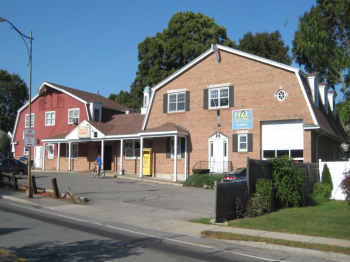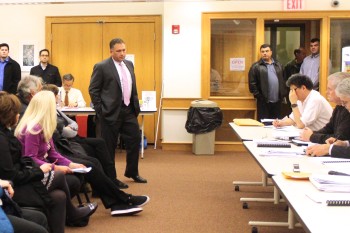Photo: Architect Ted Galante before the Zoning Board of Appeals.
It was smooth sailing as the renovation of the nine decades old Belmont Police headquarters at the intersection of Concord Avenue and Pleasant Street got its first thumbs up as it begins meetings to clear regulatory hurdles and obtain the funding for the historic preservation of the project.
“Step one done,” said Ann Marie Mahoney, chair of the DPW/BPD Building Committee which is overseeing the renovation of the police building and the facilities at the Department of Public Works after receiving unanimous approval from the Belmont Zoning Board of Appeals on Monday, Dec. 3.
“And this [vote] was good and wonderful being unanimous,” she noted.
The committee was before the ZBA seeking approval of a pair of special permits which would allow the circa 1931 headquarters project to bypass town regulations and increase the structure’s height and adding an additional floor to a portion of the building. Architect Ted Galante of The Galante Architecture Studio in Cambridge told the board the additional space would improve the building’s function and allow for a sallyport and revamping of the unsafe holding cells. There will also be a need to reconfigure the entrance to the parking lot from the corner of the intersection to a new curb cut slightly up Pleasant Street.
The changes will correct complaints of the safety of the cells and meet Americans with Disability Act regulations, said Galante, bringing the building into the 20th century. “We want a building and facility the town can be proud of,” said Belmont Police Chief Richard McLaughlin.
ZBA Chair Nicholas Iannuzzi quipped that as Belmont is a “Town of Homes,” it’s unlikely any of the residents will ever be spending time in the new cell block, only out-of-town “visitors,” to which McLaughlin agreed.
Next up for the project will be a presentation before the Planning Board in January 2019 which will review the project specifically the building’s larger floor area ratio and the landscaping in greater detail.
Earlier in the day, the committee delivered its final request to the Community Preservation Committee for a $700,000 grant to preserve the historic features of the building. While the majority of the $7 million budget will be paid for via a long-term bond financed by existing town revenue, the brickwork and other repairs to the facade is critical to complete the job.
But the request seeking funding comes during the most competitive grant cycle in the CPC’s short history. Already approved in the 2019 grant round is $400,000 for the design of an underpass on the commuter rail line at Alexander Avenue while the Board of Selectmen is seeking $1 million to design and conduct an engineering study of a community path from Belmont Center to Brighton Street. In addition, six other requests are pending. The total requested by the nine projects if funded would exceed the nearly $2 million the CPC has to provide.
“And we really need that money this [cycle],” said Mahoney.

